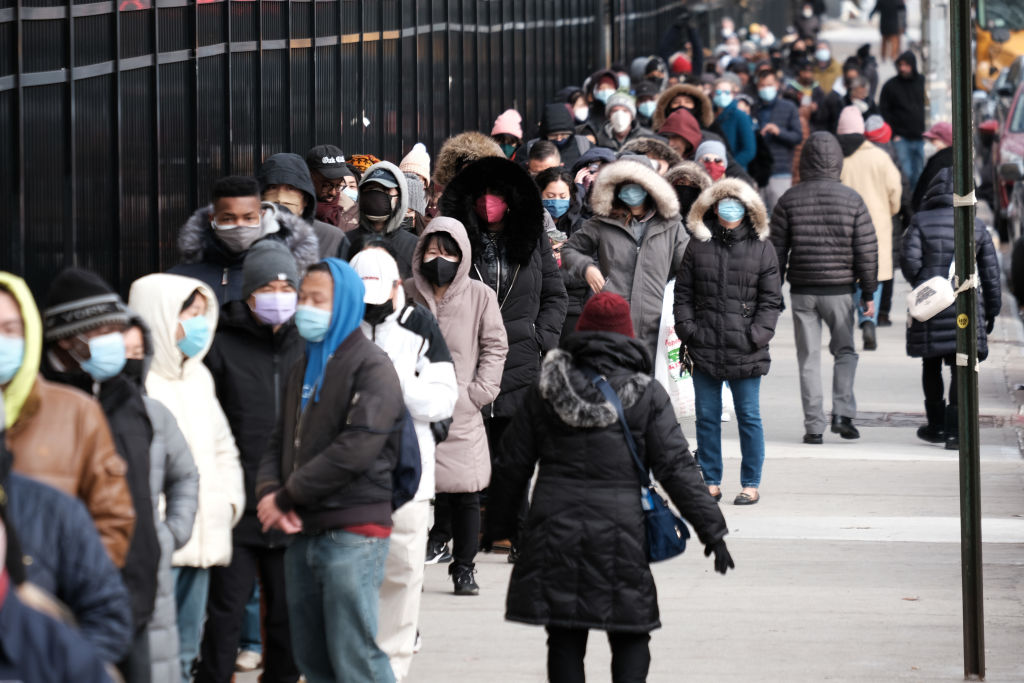CDC makes 'significant' slash to estimate of Omicron's prevalence nationwide


A free daily email with the biggest news stories of the day – and the best features from TheWeek.com
You are now subscribed
Your newsletter sign-up was successful
The Centers for Disease Control and Prevention on Tuesday estimated that the Omicron variant was responsible for about 59 percent of COVID cases nationwide in the week ending Dec. 25, reports The New York Times, "a significant decrease from the agency's previous estimate." Experts told the Times that such revisions reveal "how hard it is to track the fast-spreading variant in real time and how poorly the agency has communicated its uncertainty."
Last week, the CDC estimated that Omicron accounted for approximately 73 percent of cases for the week ending Dec. 18, but has now had to revise that down to 23 percent.
A CDC spokesperson said the issue was due to how fast Omicron's been spreading, per Politico.
The Week
Escape your echo chamber. Get the facts behind the news, plus analysis from multiple perspectives.

Sign up for The Week's Free Newsletters
From our morning news briefing to a weekly Good News Newsletter, get the best of The Week delivered directly to your inbox.
From our morning news briefing to a weekly Good News Newsletter, get the best of The Week delivered directly to your inbox.
"There was a wide predictive interval posted in last week's chart, in part because of the speed at which Omicron was increasing," said CDC spokesperson Jasmine Reed. "We had more data come in from that timeframe and there was a reduced proportion of Omicron."
Experts "were not surprised" by the CDC's revisions, given the estimation process, but felt the agency "did a poor job" conveying the uncertainty of it all, writes the Times.
"I think this is one example among many where scientists are trying to project an air of confidence about what's going to happen," said virologist David O'Connor.
That said, this current estimate of 59 percent is also likely to change, experts noted.
A free daily email with the biggest news stories of the day – and the best features from TheWeek.com
"I just want people to be very aware that that is an estimate, that's not actually from sequence-confirmed cases," added epidemiologist Nathan Grubaugh. "With Omicron in particular, it's been very difficult to have any sort of projections, because things are changing just so so rapidly." Read more at The New York Times.
Brigid Kennedy worked at The Week from 2021 to 2023 as a staff writer, junior editor and then story editor, with an interest in U.S. politics, the economy and the music industry.
-
 How the FCC’s ‘equal time’ rule works
How the FCC’s ‘equal time’ rule worksIn the Spotlight The law is at the heart of the Colbert-CBS conflict
-
 What is the endgame in the DHS shutdown?
What is the endgame in the DHS shutdown?Today’s Big Question Democrats want to rein in ICE’s immigration crackdown
-
 ‘Poor time management isn’t just an inconvenience’
‘Poor time management isn’t just an inconvenience’Instant Opinion Opinion, comment and editorials of the day
-
 A Nipah virus outbreak in India has brought back Covid-era surveillance
A Nipah virus outbreak in India has brought back Covid-era surveillanceUnder the radar The disease can spread through animals and humans
-
 Trump HHS slashes advised child vaccinations
Trump HHS slashes advised child vaccinationsSpeed Read In a widely condemned move, the CDC will now recommend that children get vaccinated against 11 communicable diseases, not 17
-
 Covid-19 mRNA vaccines could help fight cancer
Covid-19 mRNA vaccines could help fight cancerUnder the radar They boost the immune system
-
 FDA OKs generic abortion pill, riling the right
FDA OKs generic abortion pill, riling the rightSpeed Read The drug in question is a generic version of mifepristone, used to carry out two-thirds of US abortions
-
 The new Stratus Covid strain – and why it’s on the rise
The new Stratus Covid strain – and why it’s on the riseThe Explainer ‘No evidence’ new variant is more dangerous or that vaccines won’t work against it, say UK health experts
-
 RFK Jr. vaccine panel advises restricting MMRV shot
RFK Jr. vaccine panel advises restricting MMRV shotSpeed Read The committee voted to restrict access to a childhood vaccine against chickenpox
-
 Texas declares end to measles outbreak
Texas declares end to measles outbreakSpeed Read The vaccine-preventable disease is still spreading in neighboring states, Mexico and Canada
-
 RFK Jr. shuts down mRNA vaccine funding at agency
RFK Jr. shuts down mRNA vaccine funding at agencySpeed Read The decision canceled or modified 22 projects, primarily for work on vaccines and therapeutics for respiratory viruses
